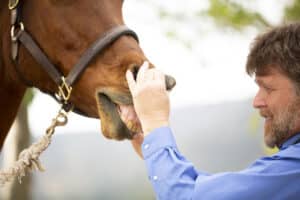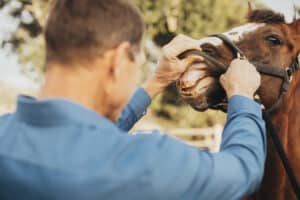Horses as non-ruminant herbivores process very specialized dentition to process forage before it enters the enteric system. Because horses have a simple stomach, feed must be broken down to a much greater extent than other herbivores. The equine mouth consists of 4 large arcades of pre-molars and molars that act as giant shearing surfaces to grind hay and feed into small particles.
Unlike people, horses have teeth that erupt slowly over their lifetime. In areas where the upper and lower teeth have limited occlusion, sharp points occur. This happens most commonly on the outside of the upper and inside surface of the lower cheek teeth. Routine dental exams and floating or filing of the teeth on an annual basis will allow the horse to process feed efficiently and accept the bit in a much easier fashion.
Signs of dental and periodontal disease in horses may vary depending on the condition and use of the horse. Any horse with the following clinical signs should be evaluated for dental problems:
Annual exams at the time of vaccinations are important in accessing oral health of your horse.


P.O. Box 6466
Santa Barbara, California 93160
Please send your resume to:
[email protected]
© Copyright 2025 | Mission Equine Associates – All Rights Reserved
Powered by JFM Web Design